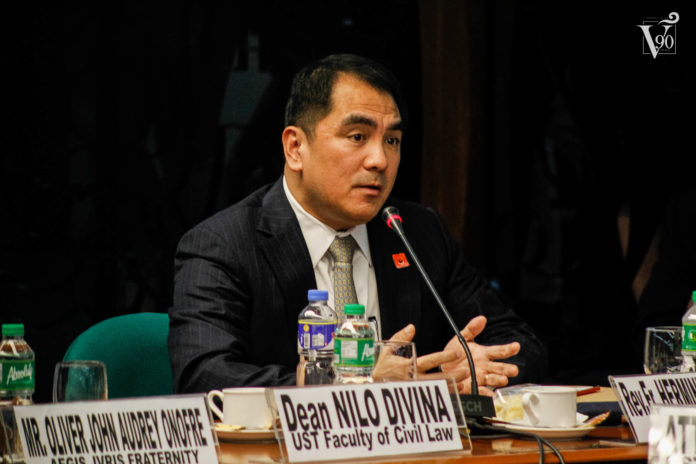FACULTY of Civil Law Dean Nilo Divina has denied accusations that he took part in multiple attempts at covering up the fatal hazing of law freshman Horacio “Atio” Castillo III, saying the claim was baseless.
“It is nothing but a forced narrative of complicity based on sheer conjectures and twisted logic being pushed by some quarters with sinister motives to smear my good name,” Divina told the Varsitarian in a text message.
Divina also defended his decision to suspend members of the Aegis Juris fraternity after news of the hazing incident broke out, citing regulations from the Commission on Higher Education that authorized him to do so.
“My foremost concern in imposing preventive suspension is to protect the interests of the student body, which is what Section 106 of the Manual [of Regulations for Private Higher Education Institutions] clearly contemplates,” Divina said in his counter-affidavit filed with the Department of Justice (DOJ) last Oct. 30.
Members of the Aegis Juris Fraternity were placed under indefinite preventive suspension and were barred from entering the University under Divina’s memo last Sept. 18, following Atio’s death during hazing rites.
The suspension was partially lifted last Sept. 20 to allow the police to talk to members of the fraternity.
Under Section 106 of the Manual of Regulations for Private Higher Education, preventive suspension may be imposed on students under investigation if it could cause “sufficient distraction to the normal operations of the institution.”
“I was absolutely convinced that without the preventive suspension, the presence of the fraternity members would not only cause ‘sufficient distraction’ but would in fact, and did in fact, cause panic, fear and serious anxiety among the student body,” Divina said.
Atio’s parents Horacio Jr. and Carmina Castillo, claimed that the suspension of Aegis Juris members was dubious since Divina had admitted during a Senate inquiry last Sept. 25 that he knew of their son’s death the day before, yet still issued the suspension that supposedly hindered police investigations.
Divina argued that the information he had was unconfirmed at that time and that he only had the neophyte’s surname, Castillo.
“Without any confirmation, prudence guided us to take a more careful course of action,” Divina said.
Carmina, Atio’s mother, insisted that the dean should have acted immediately after learning that a neophyte had died due to hazing.
“Well he has the capability of researching as soon as possible the moment that he knew about it. Puwede niyang pabuksan ‘yung opisina niya at puwede niyang ipahalungkat dahil ilan lang ba ang Castillo sa Civil Law,” she told reporters after the preliminary investigation of DOJ last Oct. 30.
Divina asserted that his actions did not constitute a crime under the Anti-Hazing Law.
Under Republic Act (RA) 8049 or the Anti-Hazing Law, school authorities could be held liable as accomplices if they consented to the hazing or had actual knowledge of it, but failed to prevent it from happening.
In a supplemental complaint filed before DOJ last Oct. 9, Atio’s parents accused Divina of knowing about the hazing rites and covering up for the Aegis Juris members involved in the incident.
‘Hearsay evidence’
Divina also dismissed accusations that Atio visited his law office within the supposed week-long fraternity initiation rites.
In their supplemental affidavit, Atio’s parents said Divina knew about the hazing because of a supposed meeting between Atio and Divina last Sept. 12. The parents learned about the meeting through Atio’s text messages.
Divina said the alleged meeting between him and Atio could not be used against him as the information came from “hearsay.”
“In the first place, whatever Atio may have told the complainant Carmina is hearsay in nature and cannot be used against me, as it is also proscribed under the res inter alios acta rule (hearsay rule),” he said.
He also emphasized that Atio did not mention his name during the text exchange, but merely said he was in a law office around the Petron gas station along Gil Puyat Avenue (formerly Buendia) in Makati.
“Indeed, there must be at least a dozen law firms in the Petron area. In our building alone, there are several law firms,” read his counter-affidavit.
Divina also submitted a USB video recording of the entire day of Sept. 12 showing that Atio did not come to his office, and a document signed by Aegis Juris “Grand Praefectus” Arvin Balag vowing to abide by the Anti-Hazing Law.
“The Aegis Juris Fraternity hereby declares its commitment to the Anti-Hazing Law and swears not to violate its provisions. The Fraternity declares that it will live up to the objective that it has personally set, to ensure that violence shall not be used, not just in the recruitment of its members but in all aspect of its conduct as an organization established in the University of Santo Tomas,” the document read.
Divina also pointed out that recruitment of freshmen in any organization had been prohibited, giving him the “right to assume” that all organizations complied.
“I have also absolutely prohibited the recruitment of freshmen in any organization. Every year, during orientation week, students are reminded about the prohibition against hazing and its perils. Given all these measures, I had every right to assume that fraternities will comply with law and school regulations,” Divina’s counter-affidavit added.
In a Senate probe last Sept. 25, UST Office for Student Affairs Director Ma. Socorro Guan Hing told senators that the Aegis Juris was not a recognized fraternity for Academic Year 2017-2018.
Divina also revealed in another Senate hearing that Aegis Juris failed to gain reaccreditation due to the academic deficiencies of its officers, including Balag.
Divina submitted his counter-affidavit in the morning of Oct. 30 and was not present during the scheduled preliminary investigation of the DOJ in the afternoon.
Balag: No proof I joined hazing
Arvin Balag, grand praefectus of Aegis Juris Fraternity, has called for the dismissal of the complaints filed against him by Atio’s parents, saying they were baseless and lacked merit.
Balag claimed he could not be held liable for murder and for violation of RA 8049 “for the simple reason that neither [his] presence nor [his] participation was proven by the complainants.”
With no witness to state his actual and direct participation to the hazing, Balag stated that the “allegations in the complaints are not facts but conclusion of facts and law” and were insufficient to constitute an offense.
“The instant complaint against me should be rightfully dismissed by this Honorable Panel for lack of merit and for failure of Complainants to prove by probable cause that I committed violations of Republic Act No. 8049 (Anti-Hazing Law) and Article 248 of the Revised Penal Code (murder),” Balag said in his counter-affidavit filed last Oct. 30.
Balag added that there was no evidence that would prove that Atio “was placed in some embarrassing or humiliating situation or subjected to physical or psychological suffering or injury as a prerequisite for admission or entry to an organization” and that he had any direct participation.
Balag echoed the claims of John Paul Solano, one of the main suspects, that Atio’s death was not caused by hazing but by cardiac arrest due to his pre-existing heart condition, hypertrophic cardiomyopathy, as stated in a medico-legal report.
Atio’s parents had refuted this, saying their son underwent a medical checkup and was declared healthy upon entering the University.
Balag also “categorically and specifically” denied his involvement in the “screenshots of conversation” from Facebook’s messaging app.
But he said the screen shots were not admissible as evidence “because they violate the constitutionally guaranteed right to privacy of communication and correspondence enshrined in Section 3 Article 3 (Bill of Rights) of the 1987 constitution.”
Balag, who was detained in the Senate after being cited in contempt due to his refusal to answer questions in a committee investigation, filed his counter-affidavit on Oct. 30 following the testimony of frat member Mark Anthony Ventura that identified him as one of the perpetrators of the hazing.
Ventura has decided to become a government witness against his fraternity brothers, marking a decisive turn in the hazing case.
Charges against Ventura
Lorna Kapunan, legal counsel of the Castillo family, said the withdrawal of the charges against Ventura would be at the discretion of the investigating panel and DOJ.
Under the law, for a person to qualify as a state witness, he has to be charged with a crime and there should be a determination that he was not the most guilty of the accusation.
Ventura, former secretary of the Aegis Juris Fraternity, was taken in as state witness last Oct. 26 following his testimony that detailed the hazing of Atio.
For Sen. Joel Villanueva, Ventura’s testimony was a “welcome development” in the case.
“Natutuwa tayo. It’s a welcome development ‘yung narinig natin na statements and affidavit ni Mr. Ventura at ito ay magigiging tulong upang lumabas yung katotohanan,” he said last Oct. 27.
He urged other Aegis Juris members to “step up” like Ventura, who he said was courageous for his willingness to go against his “brods.”
“Gusto ko din sabihin na panawagan na din sa mga kasama dito sa Aegis Juris na magstep-up sila…magsalita na din po nang sa gayon ay tuluyan nang lumabas ang katotohanan at tayo, hindi dapat matakot dun sa accountability natin. Kung sino man ang dapat managot, ay dapat managot,” he said.
The Senate inquiry resumes today, Nov. 6. with reports from Ianna Gayle S. Agus
To investigate and expose unspoken issues and anomalies, send confidential news tips to the Special Reports team of the Varsitarian at specialreports.varsitarian@gmail.com or at THE VARSITARIAN office, Rm. 105, Tan Yan Kee Student Center, University of Santo Tomas, España, Manila.












 IF A NOVEL is labeled “Harry Potter and the Holocaust” by the New York Times, it can only mean that it is probably worth looking into.
IF A NOVEL is labeled “Harry Potter and the Holocaust” by the New York Times, it can only mean that it is probably worth looking into.







My only question in the aegis juris hazing is
” WHY WAS A PHYSICIAN NOT PRESENT IN THE HAZING RITES?”
This alone redounds to irresponsibility, lack of preparedness, and lack of concern for neophytes.